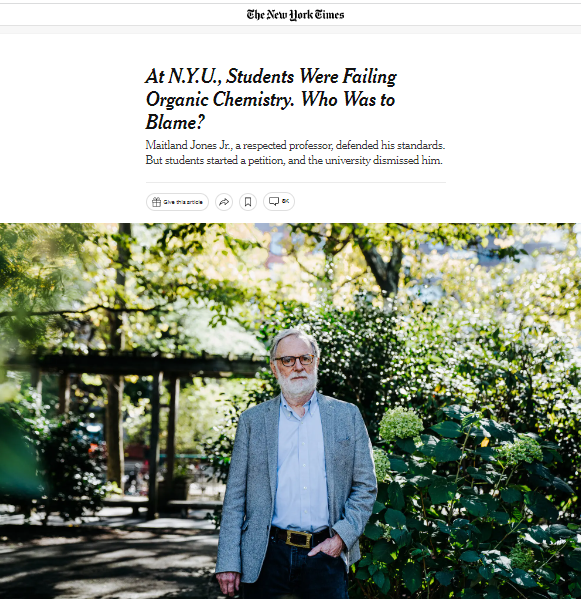@EndDomination , fantastic and very hopeful article coming out of InsideHigherEd:
The controversial firing of an organic chemistry professor at New York University speaks to broader issues about student success in “weed-out” courses, Jonathan Zimmerman writes.

www.insidehighered.com
That, too, should concern every American faculty member. To be clear, I don’t think we should lower our standards to allow more students—whatever their backgrounds—to skate by. Rather, we should assist them in meeting the kind of high standards that Maitland Jones reportedly set.
That’s what David Laude did at the University of Texas, where he proved that more people will rise to the mark if we provide them the proper support. Like Jones, Laude is a prominent chemistry professor. And for many years, large numbers of students flunked his freshman survey course.
Initially, Laude took a kind of grim pride in that. He was holding these kids accountable, damn it! And if they didn’t make it, it was their own damned fault. As recounted in the journalist Paul Tough’s invaluable book,
The Years That Matter Most: How College Makes or Breaks Us (
Mariner Books, 2019), Laude even participated in a time-honored ritual of weed-out courses: he would ask two or three students to stand on the first day of class and then announce that it was statistically probable that one of them would fail.
But the ones most likely to do so came from low-income families and attended public high schools with few advanced classes, as Laude realized when he looked at his grade distribution. Many were first-generation college students. They reminded him of his younger self:
born into a working-class family, he had barely passed freshman chemistry. Rather than assuming that a consistent fraction of students would fail, he started to wonder how he could help them succeed.
Like any good scientist, he devised an experiment to find out. He placed students who came to college with low SAT scores into a smaller section of his course, where they also received extra support from tutors and advisers. But the content they studied was identical to what Laude taught in his regular large-group course: same textbooks, same lectures, same tests.
The result? The students in the smaller section earned the same average grades as those in the regular lecture course. Even more, they graduated three years later at a higher rate than the students in the larger section did.
You don’t have to be a brain surgeon—or an organic chemist—to see why. Laude didn’t water down the course material for the underprivileged students, in any way; rather, he developed new ways to assist them in learning it. Other universities have followed suit, radically reducing student failures by providing tutors, advisers and smaller classes. They have also instituted digital “nudges,” such as text messages offering to help people who have failed an exam and video testaments by successful students describing their initial struggles.
Although this “student success movement”—as its adherents call it—is still in its infancy, we already have data suggesting that its interventions can have powerful effects. What we don’t have is a shared institutional commitment to student success itself. I’m talking about you, and me, and everyone else who works in higher education. If we were truly dedicated to students’ academic growth, we wouldn’t need a special “movement” devoted to it.


